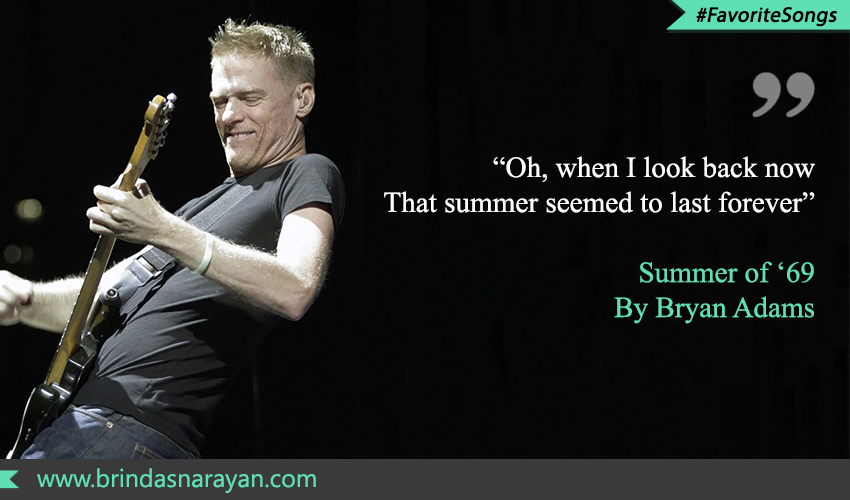
Dwelling On The Summer of ’69 by Bryan Adams
I’m back to riffing on a favorite song. While I realize that many in the younger generation might not have heard this ever, I hope at least a few Gen Xers and Baby Boomers can relate to the ‘80s hit: Summer of ’69 by the Canadian singer, songwriter and guitarist, Bryan Adams. While there are many other Adams’ songs that can be contenders for a favorites list, I find Summer of ’69 distinctly appealing because it evokes, at least for some of us, the feverish idealism and peculiar Zeitgeist that permeated the sixties.
Even if we weren’t teenagers in that tumultuous era, those of us who inhabited American college campuses in the 1980s were infected by the ‘60s counterculture movement. Recently, while googling this song I was startled and even a bit disconcerted to learn that Bryan Adams hadn’t planned to evoke the year 1969 in his song.
Startled but also indifferent to Adams’ own motives. After all, as listeners, we don’t need to heed the songwriter’s intentions. Just like readers can blithely disregard authorial designs, and interpret texts as they please, I’m going to dwell on the year 1969 and why the song might be particularly appropriate as a descriptor of that period.
The Events That Marked 1969
Before mulling over the song’s lyrics, I want to briefly recall the forces that shaped the year, particularly in the American context.
In a special Single Issue Magazine of The New York Times titled “Summer of ‘69”, the subheading reads: “When Everything Happened. And Everything Changed.” Why was that year so memorable? It was the culmination of the Civil Rights Movement and a witness to many other epochal events: a gradual withdrawal of troops from the Vietnam war, the breakout of Stonewall riots in New York, the Woodstock music festival and “men” trampling on the moon (let’s reiterate this: there were no women on that moon mission).
American Troops Drawn Back From Vietnam
Responding to anti-war protests, and perhaps the sheer futility of fighting a battle in an impossible terrain, American troops were slowly drawn back. The United States was perhaps finally conceding that the war was unwinnable. As the writer William Broyles reminisces in an article, soldiers on both sides were brave. Immensely so. But they weren’t stupid. “We would die for one another, but we didn’t want to die for nothing.”
An Iconic Festival at Woodstock
Woodstock, a music festival held at a dairy farm in August 1969, was to epitomize the hope and betrayals of the ‘60s: music, swaying crowds, psychedelic drugs and a sense of organized chaos. But apart from Jimi Hendrix, Woodstock was largely a white festival. Blacks were congregating elsewhere, like at the Harlem Cultural Festival, which was also termed the “Black Woodstock.”
Stonewall Riots: The Beginnings of the Queer Rights Movement
The Stonewall riots erupted in lower Manhattan in June 1969, when police raided, as was common in those times, a gay bar. Protests continued for several days thereafter, eventually leading to more enduring changes, including the Pride Marches that started claiming rightful attention across various cities. Since then, the needle on LGBTQ rights has moved in many parts of the world, though there is still a long way to go.
Mario Puzo Pens The Godfather
In that year, in a basement in Long Island, Mario Puzo typed out a manuscript to lift his family out of debt. That book, written in desperation, would do much more than pay off the writer’s debts. It would make him rich and famous. His wildly popular The Godfather, brought to light the paradoxically tightknit family ties and ruthless submission to authority that marked the Corleones.
1969 and The Summer of ‘69
The song, in large part, dwells on the singer acquiring a guitar, forming a band, falling in love and breaking up – with his lover and his band. Just like many high-school or early college romances might fizzle out, bands dissolve when members are tugged in different directions: “Jimmy quit and Jody got married.” Yet, while it lasted, there was something about that summer that seemed to signify eternity, or at least a lasting buoyancy. The sense that one’s youthfulness and freedom – the boundlessness that accompanies a certain period in life will never fade or diminish: “That summer seemed to last forever.”
Why does the song represent that era so well? For one thing, a young adult buying a guitar and then joining a band epitomizes values of the counterculture movement: hope, freedom, rebellion, creativity, love, change. But it was a movement that also betrayed its participants, just like the singer and guitarist realizes in the song: “I should have known we’d never get far.” As we all know, many of those hard-won rights have since been wrested back by authoritarian or institutional forces, with the pendulum swinging this way and that.
Then there is the typical tediousness that follows most revolutions. Or the reality that weighs down on dreamers and artists, who often need to give up on idealistic visions or itinerant lives, to settle down and make a living. Revolutions often mask how difficult and banal it is to fit back into a new order. While there were substantive gains from the experience, there were reversals and disappointments too.
The woman who had promised to “wait forever” hadn’t waited. Yet, with the kind of adult resignation that one accumulates with growing up, the singer accepts that “nothing can last forever.” It’s an impermanence that’s both unsettling and relieving. Fortunately, one can always return to those “best days” in a rather convenient contemporary format: by just tuning into Bryan Adams on YouTube.
References
https://www.nytimes.com/2019/07/10/us/the-vietnam-war-was-already-lost-but-i-had-to-go-anyway.html
https://www.nytimes.com/2019/08/15/arts/music/black-woodstock-harlem-festival-1969.html
https://nypost.com/2019/03/02/how-mario-puzo-penned-the-godfather-to-get-out-of-debt-and-made-bank/





Brinda – Thank u for a well researched piece. Never realised other than strong arming the moon, 1969 had so many other significant events